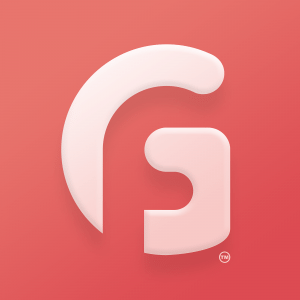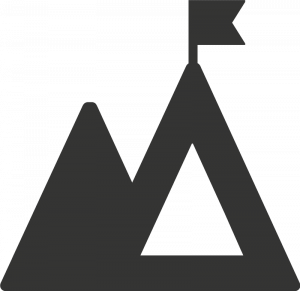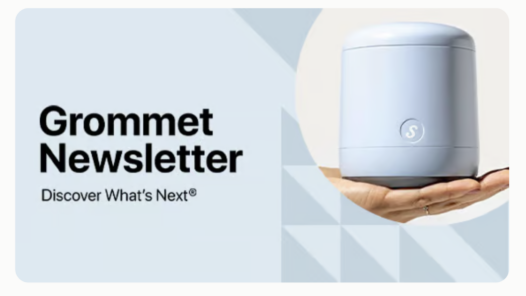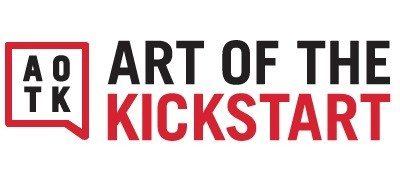Roy Morejon:
Welcome to Art of the Kickstart, your source for crowdfunding campaign success. I’m your host Roy Morejon, president of Enventys Partners, the top full-service turnkey product development and crowdfunding marketing agency in the world. We have helped startups raise over $100 million for our clients since 2010. Each week, I’ll interview a crowdfunding success story, an inspirational entrepreneur, or a business expert in order to help you take your startup to the next level with crowdfunding. Art of the Kickstart is honored to be sponsored by BackerKit and the Gadget Flow. BackerKit makes software that crowdfunding project creators use to survey backers, organize data, and manage orders for fulfillment by automating your operations and helping you print and ship faster. The Gadget Flow is a product discovery platform that helps you discover, save, and buy awesome products. It is the ultimate buyer’s guide for luxury gadgets and creative gifts. Now, let’s get on with the show.
Welcome to another edition of Art of the Kickstart. Today, I am joined by Derek Miller. Derek, thank you so much for joining us today.
Derek Miller:
Hey, thanks for having me.
Roy Morejon:
So Derek, you are a prolific crowdfunder. You guys have done three campaigns now, raised over four-and-a-half million dollars for your campaigns. These are some of the most well-known projects on Kickstarter: the Cyanide & Happiness Show, Joking Hazard. You guys have created some killer campaigns out there, so first, obviously thank you for being on the show. Second, give our audience a little bit of background about what you guys are doing and why you guys used crowdfunding to launch these campaigns.
Derek Miller:
Yeah, that’s a fun story. Cyanide & Happiness, they started off as animators. Then they went to the comic where they started getting a little bit more traction, but they always loved animation so in about 2010, they tried going to Hollywood with some animations to see if they could get a show. All the deals were straight up garbage. Basically, we could get fired from our own show and they could keep all the IP forever. Naturally, crowdfunding kind of came across as the right solution because we needed funds. We knew we had a dedicated fan base, and we wanted to keep our control. I got involved in 2013 to help run the first campaign for the Cyanide & Happiness Show. After that one raised $770,000, that allowed us to launch our weekly shorts on YouTube. We’ve since gotten two extra seasons of the show funded by an NBC affiliate, Seeso. Since then, we’ve been producing animation and knocking out more Kickstarters just because it seems right for our brand.
Roy Morejon:
So right now, Derek, you guys are working on a book I’m told on how to run kick-ass crowdfunding campaigns and put all of that knowledge into a book for obviously six-figure and seven-figure crowdfunding campaigns. Can you tell our audience a little bit about that?
Derek Miller:
Absolutely. The purpose of the book is basically a book I wish I had in front of me for the first campaign, because to be quite honest, I am very happy with the amount we raised but we were very fortunate to have not shot ourselves in the foot. We made a lot of decisions at last second, increasing stretch goals or trying to promise more than we actually should have, but thankfully we were able to recover from those issues. It’d be scary for an independent artist to raise a lot of money like that and then not being able to produce your thing. A lot of what we learned from the first campaign and then the next two, kind of want to condense what myself and our friends who have worked on other campaigns have learned to try and prevent people from shooting themselves in the dang foot when there’s no reason for it.
Roy Morejon:
Yeah, so I noticed on your first campaign, the biggest issue you guys had mentioned was over-merchandising the rewards, which obviously created a ton of headaches for you guys: delays, and getting all the physical products produced, making all these t-shirts, and all that fun stuff. Now for the second one, you guys did just the game itself and simplified it. Do you think that helped the campaign overall and not just the headache on the backend?
Derek Miller:
100%. It’s very easy to get caught up in extras and add-ons and be like, “Oh, well I need such-and-such tiers to fill these numbers out.” Sure; if that works within your product, great. When it comes down to it, if your product itself cannot draw enough interest to fund, that’s the core problem. T-shirts, mugs, whatnot, that’s not going to move the needle. It’s only going to increase your complexity and take away money from working on your main project, and that’s what happened with the C&H show. We spent a lot of money on merch that could’ve been on fart jokes.
Roy Morejon:
Indeed. That would be a good use for it, right?
Derek Miller:
The best.
Roy Morejon:
So, what do you think the biggest benefits crowdfunding offers to creators?
Derek Miller:
I think the biggest benefits are kind of what I touched on. When it comes down to it as an artist, unfortunately, money doesn’t rain from the sky. I’ve been trying as hard as I can, no luck. I’m still working on the formula. At some point in your artist career, you have to determine who’s going to be your customer. Is it going to be an agency or a main company if you’re a writer? Is it going to be a gallery? Is it going to be advertisers if you’re doing stuff for free on our website, or is it going to be your audience? I think the value of crowdfunding is that allows you to get funded directly by the people that love what you’re doing for you, and not as much what you can do for them. One of the things we’re seeing right now, especially on YouTube and especially for the jokes we do; we’re South Park with stick figures, you are passively censored by advertisers. Proctor & Gamble does not want to put their stuff next to our content. That’s fine, that’s cool, but you need money to make art.
I think the real value of crowdfunding is it allows you to choose, I think you have to work harder for this customer, but I think the fan, the person that supports you, that’s your best customer. That’s the ideal customer.
Roy Morejon:
Derek, what would you say is the most important thing a creator should do before launching their crowdfunding project? Can you talk a little bit about some of the steps that you guys took in terms of pre-campaign work?
Derek Miller:
Yeah. You hit on it; the pre-campaign is where it’s at because again, you’re launching a very public product launch. You need to have all the kinks figured out beforehand, what are people’s reservations, what are the price points, before the launch so you’re not changing in the middle of the campaign and looking like you don’t know what you do. To boil it down to a specific point, you need to be talking and testing your product with customers, bare minimum, three months before you launch the campaign because when you’re selling a product through Facebook ads or social media or email lists, you need to be able to know what people’s pain points are, what language they use to describe it, and how to speak the language of people you’re trying to make happy. Even simple things, like Joking Hazard very clearly is kind of a Cards Against Humanity-style game, and using that language makes it easier for people to go, “Oh, I get it.”
Initially when we started testing it out, we didn’t just think about that. You’re so close to a product, it’s very easy to forget how to view it with fresh eyes, and that’s the real value of just talking and talking to your fans, is seeing things with fresh eyes and seeing what your product actually is versus what you think it is.
Roy Morejon:
Got it. Let’s talk a little bit about stats-wise. Before you guys launched the campaign, how many fans, followers, email addresses, all of those things had you built up thus far?
Derek Miller:
Oh man. I know the numbers for Joking Hazard off the top of my head. We had about seven or eight million on Facebook, three-and-a-half million on YouTube, probably about five million monthly uniques on our website. Those are where we drew up the most traffic. One of the things I think that we’re doing as a brand now is realizing the importance of email lists and being able to directly talk to your fans as opposed to relying on Facebook or YouTube to [own 08:16] that relationship. On the most recent game, we just started building our email list but every single email we collected earned us between 10 to 14 times the amount of revenue a social media like or a Twitter follow.
Roy Morejon:
So would you say that the email list itself gave you guys the greatest return on your investment?
Derek Miller:
100%. Out of all the promotion we did with like a secret campaign launch page that you could only find by signing up to this hidden website, the effort we put in there was worth far more than what we got from spinning our wheels trying to get press or many other common things. On a one for one basis, the email list, there’s currently nothing that beats it. That’s one of the things I’m talking about in the book. The stronger your email list is, the stronger your campaign will be.
Roy Morejon:
Absolutely. So you’ve made the potential backers do a little bit of work before they get access to the campaign page?
Derek Miller:
Yeah, so it kind of pre-qualified the ones who are super interested and willing to spread the news about their friends. Even though we only had I think about 2,000 people originally sign up through the list or something, list signups continued growing even after the announcement. We weren’t promoting the page. The traffic was starting to just grow organically because people we pre-qualified as super fans were already out there spreading our message for us.
Roy Morejon:
Interesting. With such a massive following that you guys have on Facebook, and this is a question outside of crowdfunding, how are you guys seeing the recent changes with the Facebook algorithm towards the content you guys are creating? Have you changed your strategy at all?
Derek Miller:
For our particular strategy on Facebook, it’s more just kind of a mind space sort of thing. We are going to move more towards user interaction, drawing people in, inviting them out to our Banana Bar Crawl, which is one of our yearly fan appreciation things. It didn’t really come as much of a surprise because for the last couple years, every single January or whenever they do their annual shareholders meeting, Facebook is saying, “We’re not going to give people free promotion.” They’re an amazing data advertising platform. While it was free publicity and free access to fans when Facebook started, as it’s built up, again, they’re a business and they’re a tollbooth. You’re parking your fans on someone else’s parking lot, and they’re going to continue increasing their rates because brands need it. Now we’ve been planning for this and trying to build, especially with email lists, our ability to be less fragile outside of social media.
Roy Morejon:
Nice. You touched on publicity on little bit, going back to the crowdfunding campaign. Do you have any tips that would help any other crowdfunding creators get coverage?
Derek Miller:
So publicity actually, for Cyanide & Happiness, has been one of the smallest return on investment we’ve had for our campaigns. Now obviously that’s not common with every single one of them, but the few articles we did that moved the needle were people who were generally already fans of us and were willing to go through the process of testing out prototypes. We found creators on YouTube and whatnot who were like, “Oh, I love you guys. How can I help you out?” Instead of just saying, “Hey, like, share, subscribe,” we made them a part of the process and we sent them prototypes. We said, “Hey, just play it with your friends. Let me know what you think.” We started getting feedback. It was really good feedback. “This card doesn’t work” or “I’m not sure, this rule book is kind of weird right here,” “How do you feel about this image?” Again, just talking to people. Not only does that draw them into the campaign, but it also makes them feel invested in its success. Once someone’s invested in your success, they’re more likely to share it, right?
It kind of was more of a personal, one-to-one relationship we had with them. Those are the ones that move the needle more than press releases or just trying to mass cold email everyone.
Roy Morejon:
Yeah. We talk to a lot of crowdfunders who have a limited budget. What would you say is the best investment that if they didn’t have a lot to spend in terms of just marketing their campaign that they should invest in?
Derek Miller:
I say just like a simple MailChimp account so you can have an email list and basically own your fans and talk to them. Your fans, they’re a limited resource. They’re the thing that all your paycheck comes from. If it’s on someone else’s platform, sure it’s free on Facebook, but if you’re paying, I forget what it is but whatever, $10 a month on MailChimp or something to own your fans, you’ll be a lot safer. That is the expense that I say I would not skimp. There’s a lot of services out there that say, “Oh, we’ll mass press email. 6,000 press outlets.” Don’t spend your money on that because you’re just sending spam out. Talk to people on a one-to-one basis.
Roy Morejon:
Solid advice there, Derek. Where do you think most unsuccessful crowdfunders go wrong?
Derek Miller:
The biggest thing is assuming that there is a hungry, thriving, waiting mass of people sitting on Kickstarter hitting “refresh” for new products every second of every day, and they go, “Oh, as soon as my product launches, it’s going to be good.” It sounds silly when I put it that way; that’s kind of the goal, but a lot of people assume “Kickstarter is a huge site, yes it’s going to carry my campaign.” Big campaigns do get a lot of lift from it; we always have, but it’s only after it’s been funded and there’s already been early interest. If you don’t have early interest and you are not talking to someone every single second of every day, no one else is going to talk about you. There’s a lot of creators scared of, “Oh, what if I’m marketing too much? What if people hear my message twice?” With as much as there is going on the internet, like games and things that are awesome and stupid YouTube videos, you are lucky if someone hears your message twice. That’s great, that’s awesome.
Roy Morejon:
Yeah. Unfortunately, Kickstarter isn’t the field of dreams where if you build it, they will come, right?
Derek Miller:
No, not at all.
Roy Morejon:
So given that you guys have run multiple campaigns, what has changed the most in your eyes with crowdfunding over the past few years?
Derek Miller:
It’s become a much more professional sort of thing. The quality of campaigns has consistently increased whereas you could be able to get away with just some cool sketches like, “Hey, I’ve got some sweet ideas” in the early days of Kickstarter. As more campaigns have mot funded or not delivered, and there’s been scams and campaigns saying, “Oh, you need to pay an additional $200 to get my product,” backers have gotten more jaded and campaigns have had to be more professional. Most campaigns are run with a team of two, bare minimum, if not outside consultant companies and whatnot. It’s gotten more professional, and backers have gotten more savvy and doubting of what you can pull off. You have to throw a lot more credibility on your pages to show that “yes, I know what I’m doing.”
Roy Morejon:
Yeah, “trust” is definitely the key word this year in 2018.
Derek Miller:
Oh yeah.
Roy Morejon:
What would you be your biggest piece of advice for someone planning on launching a campaign this year?
Derek Miller:
I think it probably ties into just the email thing right there. The biggest thing is, attention is scarce. There is an infinite number of things in the internet, infinite number of things to do. You check your Facebook 30 times a day, whatever. In order to be able to capture someone’s attention, you need to know their needs. You need to know the language, you need to know their paying points, and you need to have a direct way to talk to them. From what we’ve found and from the creators I’ve talked to, there’s nothing better than having a list of ready, waiting customers for the second that campaign launches.
Roy Morejon:
Indeed. All right, Derek. This gets us into our launch round where I’m going to rapid-fire a handful of questions at you. You good to go?
Derek Miller:
Cool, yeah.
Roy Morejon:
What inspired you to be an entrepreneur?
Derek Miller:
Not wanting to take orders.
Roy Morejon:
So if you could meet with any entrepreneur throughout history, who would it be?
Derek Miller:
That’s a tough one. Probably just go with at this point, Elon Musk because the guy is insanely inspirational. He’s also very willing to bend the laws of reality and what people say is and is not possible. He’s surprisingly effective at that.Roy Morejon:
What would be your first question to Elon?
Derek Miller:
“What’s your bank account number?”
Roy Morejon:
“How many commas?” Right?
Derek Miller:
Yeah, yeah.
Roy Morejon:
He’s not taking a salary, so I’m sure he’s got lots of commas though.
Derek Miller:
Yeah, I’m sure he’s doing okay.
Roy Morejon:
Are there any books outside of yours that you would recommend to our listeners?
Derek Miller:
100%. A book called “Never Split The Difference” by Chris Voss. He spent his time as a FBI hostage negotiator, and he walks through hostage negotiation, but when it comes down to the applicability of these skills, within one week of reading the book I had a fight with girlfriend and it actually came out super awesome. We came out happy. I was having difficulty at the office. It came out what everyone actually cared about, and again, it resolved itself great. It’s not just like, “Oh, I’m going to go get in fights and try to talk my way out of them.” It’s life skills for how to deal with people who are in a very emotional state.
Roy Morejon:
So were you using the mirroring technique on your girlfriend?
Derek Miller:
Oh yeah, yeah. Not even mirroring. The biggest takeaway is the phrase “how am I supposed to do that?” That phrase is worth its weight in gold.
Roy Morejon:
Indeed. I think I’ve read Chris’ book like three times now. It’s always inspirational for that moment you need that negotiation skill. All right, last two questions: what’s your favorite crowdfunding project outside of the ones you’ve worked on?
Derek Miller:
Okay, so my favorite one is one my friends made. There’s two of them and they’re kind of in the same category. 80s cheesy movies. “Dude Bro Party Massacre 3” and “Kung Fury.” Both of them were over the top 80s movies that just attributed to people who like B movies. I can’t resist that, that’s too perfect.
Roy Morejon:
All right, Derek, last question: what does the future of crowdfunding look like?
Derek Miller:
Man, it’s getting crazy with ICOs and equity after the JOBS Act. I think at the core of it though, there’s going to be a lot of people burned in these new fields with no regulation and more importantly, regulators who aren’t even quite sure what it is. I think it’s just going to come down to trust. Same thing that’s happened with non-equity crowdfunding. The better you can focus on trust, the better you can focus on people, the better you can focus on a crowd, that’s where the money’s going to be long-term.
Roy Morejon:
So are we going to have a Cyanide & Happiness ICO in the future?
Derek Miller:
Who knows? Maybe.
Roy Morejon:
Sticks and coins, right? That’s what we’re all about.
Derek Miller:
Yeah.
Roy Morejon:
Well Derek, this has been a lot of fun. Please give our audience your pitch. Tell them what you’re all about, where they should go, and why they need to go buy your book when it comes out.
Derek Miller:
Awesome. I’m Derek Miller. I’m the Director of Product and Development for Cyanide & Happiness. Y’all probably know us; we do animations, cartoons, comics, merch, tour, and hopefully some new TV shows coming out. As per we talked about, raised money on crowdfunding, talked to a bunch of crowdfunders. If you’re interested in how to crowdfund and a way to do your business your way, you can check out my book “Six-Figure Crowdfunding.” It’s available for presale on Amazon. I also have a website, sixfigurecrowdfundig.com where you can get little brain-drippings as they come out of my head.
Roy Morejon:
Derek, this has been awesome. Audience, thanks again for tuning in. Make sure to visit artofthekickstart.com for the notes, the transcript, links to everything we talked about again. Of course, thank you to our crowdfunding podcast sponsors The Gadget Flow and BackerKit. If you loved this episode, I would love to see your review on iTunes for us. Derek Miller, thank you so much for being on Art of the Kickstart today.
Derek Miller:
Thank you.
Roy Morejon:
Thanks for tuning in to another episode of Art of the Kickstart, the show about building a business, world, and life with crowdfunding. If you’ve enjoyed today’s episode, awesome. Make sure to visit artofthekickstart.com and tell us all about it, there, you’ll find additional information about past episodes, our Kickstarter guide to crushing it, and of course if you loved this episode a lot, leave us a review at artofthekickstart.com/itunes. It helps more inventors, entrepreneurs, and startups find this show and helps us get better guests to help you build a better business. If you need more hands-on crowdfunding strategy advice, please feel free to request a quote on enventyspartners.com. Thanks again for tuning in, and we’ll see you again next week.
 Art of the Kickstart is honored to be sponsored by The Gadget Flow, a product discovery platform that helps you discover, save, and buy awesome products. The Gadget Flow is the ultimate buyer’s guide for cool luxury gadgets and creative gifts. Click here to learn more and list your product – use coupon code ATOKK16 for 20% off!
Art of the Kickstart is honored to be sponsored by The Gadget Flow, a product discovery platform that helps you discover, save, and buy awesome products. The Gadget Flow is the ultimate buyer’s guide for cool luxury gadgets and creative gifts. Click here to learn more and list your product – use coupon code ATOKK16 for 20% off! Art of the Kickstart is honored to be sponsored by BackerKit. BackerKit makes software that crowdfunding project creators use to survey backers, organize data, raise additional funds with add-ons and manage orders for fulfillment, saving creators hundreds of hours. To learn more and get started, click here.
Art of the Kickstart is honored to be sponsored by BackerKit. BackerKit makes software that crowdfunding project creators use to survey backers, organize data, raise additional funds with add-ons and manage orders for fulfillment, saving creators hundreds of hours. To learn more and get started, click here.




Hi Roy,
Thanks for this awesome podcast, very valuable tips. I learned a lot.